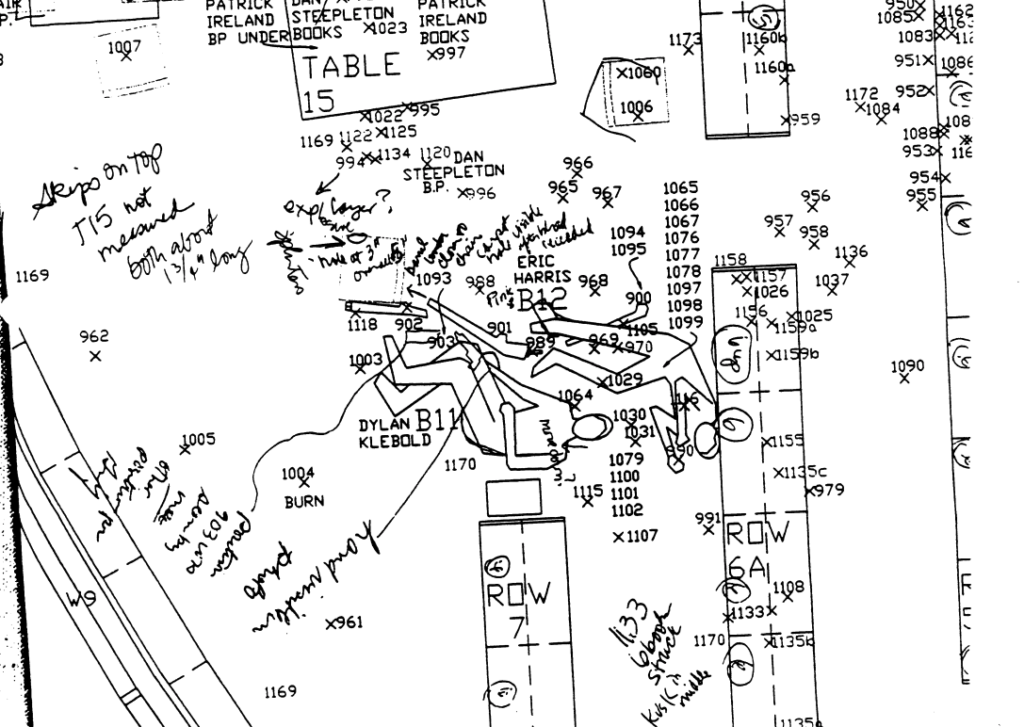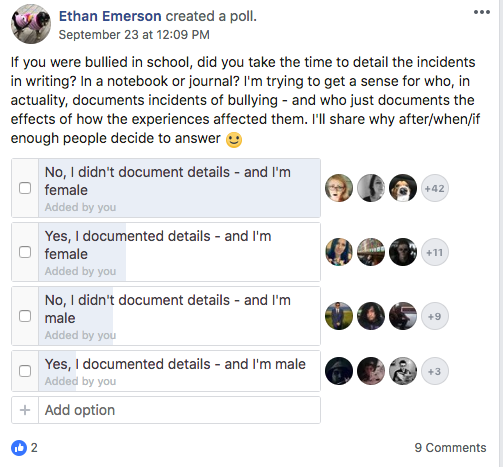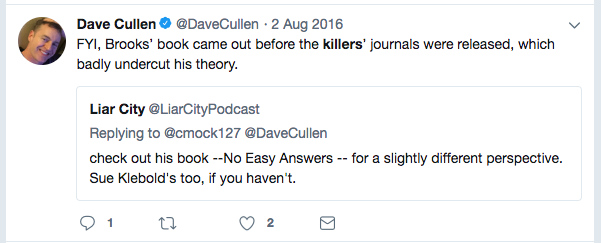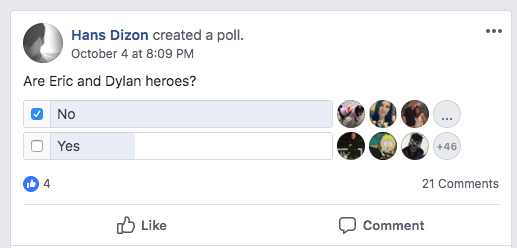Many people talk about Eric and Dylan’s journals, but they didn’t have journals. They wrote mostly on loose pieces of paper and it wasn’t technically a journal. That’s not too important save for the fact that calling their writings “journals” implies they had a daily/nightly routine where they documented their lives. They didn’t. It was sporadic and random, whenever they felt like it.
When Dave Cullen, author of Columbine and Parkland speaks or writes, he tells people that bullying didn’t cause Eric and Dylan to become violent and claims while they may have been bullied a little, it wasn’t that bad. His reasoning? They didn’t write about it in their journals.




None saw it coming? Joe Stair told me personally, in his car, while we were talking, that he wasn’t at all surprised that they did it. He said a lot of people saw it coming. They didn’t think they would go through with it because of how big of a jump it is from fantasizing about it, but they knew it was on their mind. Dylan even mentioned wanting to shoot kids on the soccer field.

Disclaimer: Please do not throw shade or hate at Dave Cullen. It doesn’t matter how much you disagree with him, he has a different view and there is a reason he has a different view. Everyone deserves respect. Attack/dissect ideas – not people.
Since Cullen is the center of controversy and hate, I need to emphasize that this post is not intended to be the catalyst for a spear-throwing riot. I have avoided discussing Cullen’s book for years because I don’t want people to go attack him, but I need to discuss his opinions for this post.
This post isn’t about Cullen, his opinion happens to be the best example for the point of this post.
Moving on…
Not only did Eric and Dylan mention being bullied (and jocks) in their writings, but I ran a poll on Facebook and found that most bullied kids never write about being bullied in their journals. I have run many polls over the years, and here’s what I found from the last poll I ran (and the only one I have a screen shot for):

45 females and 12 males said they never documented the details of being bullied.
14 females and 6 males said they documented the details of being bullies.
A total of 74% of respondents said they never documented any details of being bullied.
Females usually write down their experiences more than males, and in this poll, 58% of all respondents were females who never documented the details of being bullied.
Interesting, right? Not surprising. I was bullied from 2nd grade through 12th grade and I never wrote about any of the incidents in my journals or notebooks. I expressed my pain and upset, but never documented incidents, names, or anything.
However, the absence of evidence is not, itself, evidence. The absence of gory details, names, and dates in their “journals” does not mean they weren’t bullied.
You can ask anyone who went to Columbine from their group of friends – they got bullied and abused hard, constantly, every single day. In fact, Brooks Brown wrote about the abuse in his book No Easy Answers and discussed it in interviews.
https://www.youtube.com/watch?v=MvquFYMMOrg
Brooks: “They were the bottom two kids in the entire school, not just out of the senior class, the entire school, they were the two uncoolest kids. So they were the losers of the losers.”
:45
Like many other people, Cullen decided that the absence of documented incidents in their writing meant that Brooks was lying about what he witnessed first hand happening at his own high school. Cullen declared Brooks’ first-hand experience a “theory.”

So, did Eric and Dylan mention being bullied in their writings? Did they mention hating and being jealous of the jocks? Yes, absolutely. Many times and on Eric’s website, too.
“Everyone is always making fun of me because of how I look, how fucking weak I am and shit, well I will get you all back: ultimate fucking revenge here. You people could have shown more respect, treated me better, asked for my knowledge or guidance more, treated me more like a senior, and maybe I wouldn’t have been so ready to tear your fucking heads off. Then again, I have always hated how I looked, I make fun of people who look like me sometimes without even thinking sometimes just because I want to rip on myself. That’s where a lot of my hate grows from. The fact that I have practically no self-esteem, especially concerning girls and looks and such. Therefore people make fun of me… constantly… therefore I get no respect and therefore I get fucking PISSED.”
-Eric Harris (p.026014)
“If people would give me more compliments all of this might still be avoidable… but probably not. Whatever I do people make fun of me, and sometimes directly to my face. I’ll get revenge son enough. Fuckers shouldn’t have ripped on me so much huh! HA! Then again it’s human nature to do what you did… so I guess I am also attacking the human race.”
-Eric Harris (p.026015)
“I hate you people for leaving me out of so many fun things. And no don’t fucking say “well that’s your fault” because it isn’t, you people had my phone #, and I asked and all, but no, no no no don’t let the weird looking Eric KID come along, oh fucking nooo.”
-Eric Harris (p.026018)
“Fag jocks have to get their doc martins wet. DIEEE.”
-Eric Harris (p.026235)
And there are other references in the numerous “You know what I hate” rants from Eric’s website… and where he talks about how moving around a lot had a negative impact on him, having to start at the bottom of the ladder at every new school…
Now for Dylan’s writing… spelling errors are from being unable to read his writing. Corrections are always welcome!
“…thinking… about the asshole (redacted) in gym class, how he os me.”
-Dylan Klebold (p.026388)
“as I see the people at school – some good, some bad – I see how different I am. I see jocks having fun, friends, women, LIVES or rather shallow existences compared to mine”
-Dylan Klebold (p.026389)
“I didn’t want to be a jock. I hated the happiness that they have & I will have something infinitely better.”
-Dylan Klebold (p.026405)
“I am God & the zombies will pay for their arrogance, hate, fear, abandoned & distrust.”
-Dylan Klebold (p.026405)
“The zombies will pay for their being, their nature.” “I understand that I can never ever be a zombie, even if I wanted to.”
-Dylan Klebold (p.026412)
“I’m not a trendy asshole don’t give a fuck if it’s good enough for you.”
-Dylan Klebold (p.026436)
“I swear im like an outcast & everyone is conspiring against me…”
-Dylan Klebold (p.026392)
I have always been hated, by everyone & everything.”
-Dylan Klebold (p.026396)
“wanna die & be free with my love… if she even exists. She probably hates me… finding a noldee (?) or a jock who treats her like shit.”
-Dylan Klebold (page needed)
“In 26.4 hours, I’ll be dead & in happiness. The little zombie human fags will know their errors & be forever suffering & mourning.”
-Dylan Klebold (p.026486)
Cullen dismisses all of their mentions of being bullied and losers compared to the jocks as simply “depressed writings of killers.” He cannot see the forest for the trees. He’s staring right at reality, and yet, his vision is clouded by a haze of the new narrative that was intentionally implanted into the world, and Cullen was the ‘spore’ that was inoculated with this new narrative.
He used to see the truth. He wrote about it frequently. Then, something changed. He did an about-face. Did he really discover a deeper truth, or did someone use him to implant a “don’t-look-this-way” narrative?
How can Cullen claim he has seen no evidence that Eric and Dylan were bullied when it’s literally in every video interview, audio interview, and all over the 11k, and even in his former articles?
https://www.youtube.com/watch?v=8rLkkGOmMqc
“Joseph Stair says none of the other Trench Coat Mafia knew of a specific plan to attack the school, but did expect some revenge on athletes at Columbine High after four years of battles.”
Joe: “We hated each other, we really did. The athletes would threaten us, leave notes in lockers, as they were driving by they’d throw glass bottles and rocks and things at us, and so their large hatred built up between the two groups.”
Reporter: “Stair said Harris and Klebold asked for no help. He says some members of the Trench Coat Mafia, including himself, did make pipe bombs frequently, as quote ‘something to do.’ But he says the two suspects knew enough about planning an attack and making bombs to pull it off alone.”
Joe: “They knew how to make just about every type of explosive that you can make using household products.”
https://www.youtube.com/watch?v=tr-2DG_J1wc
“They were known as the Trench Coat Mafia at our school and the jocks, you know, ridiculed them quite a bit and when they first walked in they said if there’s any jocks in here, they’re dead.”
14:38
Wisher’s friend: “They always wear black clothing or dark clothing, glasses, berets, they get made fun of a lot.”
Wisher: “Not a lot of kids like them.”
Reporter: “They get made fun of a lot?”
Both: “Yeah, by other students sometimes.”
17:26
Chris Wisher and friend
“We were just joking…”
“I’d always say that they’d do that but I was just joking, I never actually thought they’d really do it.”
27:51
Good Morning America Reporter: “One young girl I spoke to said during the shooting she heard the gunmen shouting at some of their victims as loud as they could, “this is what you get for the way you treated us.”
28:56
With Crystal Woodman, Joshua Lapp, Justin Woods
Justin: “They didn’t target jocks or athletes? They opened fire on the students playing soccer.”
Reporter to Lapp: “Some people said that they were shooting at athletes that had sports caps on.”
Lapp: “Yeah, when they first came in, they said, all the jocks please stand up, and no one stood up, and they said all the jocks in here are dead and if you have a hat on or a white shirt with any sports emblem on it, you’re dead.”
33:42
Lapp: “There was a little black kid that I’m pretty good friends with and excuse the language but they said, ‘there’s that little nigger,’ three shots, he paused, they go, ‘is he dead?’ the other one paused and the other one said, ‘yeah he’s dead’ and I mean you could say it’s a racial thing which it appeared to be because it was towards jocks and minorities.”
37:22
https://www.youtube.com/watch?v=MvquFYMMOrg
Devon Adams: “I was pushed against a locker one day by a football player at the school because he saw me talking to Dylan and he asked me, “why are you talking to that faggot? You a dyke?”
1:14
Brooks: “Eric and Dylan did get this every day and we all knew it. And we all talked about it and we laughed about it because that’s all you can do.”
Cue the video of Eric wearing his KMFDM 97 tour shirt.
Brooks: “They’re walking through the halls and you can see a wall of jocks coming at them you get the hell out of their way. It’s their hall, their world. And Eric and Dylan didn’t get out of the way and you see the jocks lay their elbows right into Eric and almost knock the camera out of his hand [someone else was actually filming] and you don’t hear them bitching because they’re so used to it they don’t go ‘what the hell was that?’ they go ‘uh huh’ and they just move on because its so common place.
https://www.youtube.com/watch?v=Sxdf5oU5rAQ
Tad Boles: “Most of the group were considered outcasts to a point because we all hung out together, dressed the same way, everybody pretty much avoided us.”
1:21
https://www.youtube.com/watch?v=D48OoBNsZQ8
Randy Brown: “Here were three felonies we had turned into them, making and detonating pipe bombs and threatening my son’s life and they didn’t pursue it. They didn’t do their job.”
Brooks: “I was utterly dumbfounded that they did nothing with the web pages. Eric was saying how he was going to blow people up, hey I’m making pipe bombs, I’ve got the designs for them on my website, I’m going to kill these people, here’s why. That’s a level beyond making a joke.”
4:03
Nate Dykeman, about Eric’s hit list: “It was a little piece of paper that he had kept in his wallet just a list of names that he would update every day if somebody shoved him or someone called him something he would write their name down on it.”
7:00
District Attorney Dave Thomas: “A lot of the kids said oh we knew, we knew what was going on. I’ll tell ya the adults didn’t know.”
1:00
Michelle Hartsough: “No one who could do something did something. I knew it, a lot of people knew it, but…”
14:44
Then we have Evan Todd’s statement to TIME admitting he bullied Eric and Dylan as if to brag about it:
“Evan Todd, the 255-lb. defensive lineman who was wounded in the library, describes the climate this way: “Columbine is a clean, good place except for those rejects,” Todd says of Klebold, Harris and their friends. “Most kids didn’t want them there. They were into witchcraft. They were into voodoo dolls. Sure, we teased them. But what do you expect with kids who come to school with weird hairdos and horns on their hats? It’s not just jocks; the whole school’s disgusted with them. They’re a bunch of homos, grabbing each other’s private parts. If you want to get rid of someone, usually you tease’ em. So the whole school would call them homos, and when they did something sick, we’d tell them, ‘You’re sick and that’s wrong.’””
Time Magazine
December 20, 1999
pp.50-51
Then there are all the recollections from the 11k where witnesses discussed incidents of bullying as documented by SchoolShooters.info:
John Savage
: 566: DK taunted for clothes
Josh Chavez
: 736: DK made fun of in gym; called Stretch; uncoordinated, not good at sports
Danielle Danford
: 770: DK once spoke of jocks giving him trouble
Joseph Ragole
: 1,102: jocks picked on EH/DK in halls
Jordan Grimm
: 5,70102: he taunted DK about coat
Mr. Peter Horvath
(CHS dean): 5,708:34 weeks prior to attack, EH and DK said a student was mouthy to them
Susan DeWitt
: 6,196: EH mad at Mike Dinkle for making fun of him (apparently this was behind EHs back); (also
noted in Susans report on p. 18,390: EH upset/hurt that Mike Dinkle made fun of him)
Dustin Harrison
: 6,576: E &D harrassed about clothes; 6577: teachers did not intervene when EH/DK were harassed in class
Dustin Thurmon
: 7,261: made fun of EH/DK for trench coats in 90 degrees; taunted them in bowling class
Mollie Weksler
: 7,35758: teachers and a staff member picked on EH/DK
Frank Zirger
Chris Morris
: 9,823: EH picked on by jocks because he was small
Mr. Robert Kirgis
: 10,160/10,170: heard EH/DK mention they were picked on by jocks
[Blacked out]
: 10,264: relentless in his abuse of EH during gym; EH bad in sports; others teased him, too
[Blacked out]
: 10,265: had friends who taunted EH
[Blacked out]
: 10,273: made fun of EH in gym; had big head on skinny body; made fun of lots of people (not just EH)
Robert Kirgis
: 10,49092: EH and DK said they got picked on because they were nerds
Kristi Epling / Alyssa Sechler
: 10,71819: EH was teased by jocks for how he dressed and his size
Cory Friesen
: 10,726: he said EH/DK were picked on constantly at school
Chris Morris
: 10,83435: EH picked on more than DK; EH depressed about his size and getting picked on
Robert Perry
: 10,853: like a lot of other TCM members, he [EH] had been constantly picked on, taunted, and had food thrown at him
[Blacked out]
: 18,989: student had run-ins with Rocky Hoffschneider, who had also harassed EH/DK
[Blacked out]
: 19,648: DK made fun of because he didn’t fit in and was very odd
[Blacked out]
: 19,710: he and others teased EH relentlessly in gym because he was bad at sports
Other accounts:
In fact, a typical Columbine school day for Harris and Klebold was torture. Former student Devon Adams told the Governor’s Columbine Review Commission that the boys were regularly called homos, fags, losers, weirdoes, and freaks.’
Student Nathan Vanderau witnessed a cup of human feces being thrown at Eric and Dylan.
Harris got it worse than most, not just because he dressed weird or was one of the computer nerds, but also because he was short, he was a transplant from out-of-state (like Andy Williams) and, due to an embarrassing indent in his chest, he never took his shirt off during P.E., giving the jocks more ammo to attack him.
Former Columbine student Brooks Brown recounted one incident: ‘I was smoking cigarettes with [Klebold and Harris] when a bunch of football players drove by, yelled insults, and threw a glass bottle that shattered near Dylan’s feet. I was pissed, but Eric and Dylan didn’t even flinch. ‘Don’t worry about it, man,’ Dylan said. ‘It happens all the time.’“
Once, a student reported them to the administration for allegedly having brought drugs to school, just to humiliate them for a laugh. Harris and Klebold were dramatically removed from class and searched – as were their lockers and cars. No drugs were found, but the damage was done.
They were so marked for abuse that even talking to them was dangerous. One female student recounted how, when she was a Columbine freshman, some jocks spotted her talking to Dylan Klebold in the school hallway between classes. After she walked away from him, one of the bullies slammed her against the lockers and called her a “fag lover.” None of the students came to help her – and when asked later why she didn’t report the incident to the administration, she replied, “It wouldn’t do any good because they wouldn’t do anything about it.”
People surrounded them in the commons and threw ketchup covered tampons all over them, laughing at them, calling them pussies, Brown says. “That happened while teachers watched. They couldn’t fight back. They wore the ketchup all day and went home covered with it.”
“I know Dylan told his mother that it was the worst day of his life said Chad Laughlin”
Klebold may have been referencing this incident when he wrote in Harris’ yearbook of taking “our revenge in the commons.
Eric and Dylan, who usually wore black instead of the standard Columbine jacket and sweats, came in for similar harsh treatment. Jocks pushed them against lockers, yelled faggots and “loser” at them while they ate lunch in the cafeteria.
Eric and Dylan took the brunt of a lot of people’s aggression,“ says Brooks Brown.
“The stuff wasn’t always noticeable,” says Devon Adams. “There’s 2,000 kids in our school, all trying to go down one hallway in a certain period. Unless a full-on fight breaks out, you can’t really see what’s going on. Dylan would say it made him mad. He and Eric never asked for it. They never fought back, either.”
“Every day being teased and picked on, pushed up against lockers just the general feeling of fear in the school. And you either respond to a fear by having fear, or you take action and have hate. And defend yourself. And they chose a real disgusting way of doing that.Brooks Brown in Rolling Stone
Blackjack co workers Kim and Sara grew closer to Eric. He complained that some jocks were bullying him.
Sara never witnessed any taunting, but she did see classmates give Eric weird looks. She thought it was because of how he dressed. The boy who wore khaki when he started at Blackjack now draped himself in black cargo pants and black T-shirts.
Kim and Sara couldn’t understand why their classmates didn’t like Eric.
“No one ever gave him a chance,” Kim said.
Sara Schweitzberger, 15, had a gym class with Mr. Klebold, and said it was obvious he felt socially ostracized. “He really felt unloved,” she said. “He wasn’t so bad. He was lonely. I just wish I could give him a hug and tell him that I care.
Newsweek quotes a classmate saying that the two often walked the halls of Columbine “with their heads down, because if they looked up they’d get thrown into lockers and get called a fag
Time reports that they were routinely physically threatened and taunted as “dirt bags” and “inbreeds”
Finally, some of what E &D themselves left behind regarding them being bullied
Dylan:
I swear, like im an outcast, & everyone is conspiring against me”-May ’97
My god, I have always been hated, by everyone & everything, just now more-September ’97
Dylan: “If you could see all the anger I’ve stored over the past four fucking years…”
Dylan: “You made me what I am. You added to the rage.”
Dylan says that as far back as the Foothills Day Care center he hated the “stuck-up” kids who he felt hated him. “Being shy didn’t help. I’m going to kill you all. You’ve been giving us shit for years.”-March’99
Why do people choose to close their eyes to the truth?
Why do so many people ignore the obvious and well-documented, well-reported bullying? They have collapsed “bullying made Eric and Dylan feel angry, depressed, and worthless” with “bullying is justification for murder.” These people, like Cullen, believe that to acknowledge bullying shaped them into killers is to say that bullying justified their murderous actions.
That’s the only reason people can’t see the truth. They can’t separate what is (bullying) from the ideology they think comes with that.









